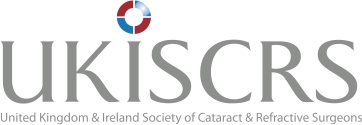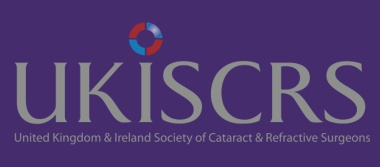2017 events
2017 events
The XXXXI Annual UKISCRS Congress - Wednesday 6th - Friday 8th September
Evaluation and Photographs to follow
Venue: The Hinckley Island Hotel, Click here to view a map of this event's location
Ticket Prices: £50 trainee member, £265 Consultant member, £380 Consultant non-member
Weds 6th September
Young Ophthalmologists Master Class - 1/2 Day
| Times | Topics | Speakers |
| Cataract Surgery Complications Masterclass | ||
| How to prevent them and how to manage them | ||
| 1300 - 1330 | Registration | |
| 1330 - 1335 | Introduction | Sid Goel/Charles Claoué |
| 1400 - 1425 | Early PC rupture during hydrodissection/nuclear removal | Brian Little |
| 1425 - 1450 | Late PC rupture during IA or IOL insertion | Larry Benjamin |
| 1450 - 1515 | Intra-operative zonular crises | Richard Packard |
|
1515 - 1535 |
COFFEE | |
| 1535 - 1600 |
High positive vitreous pressure/ iris prolapse |
Mayank Nanavaty |
| 1600 - 1625 |
How to perform the perfect Anterior Vitrectomy |
David Spalton |
| 1625 - 1650 | Secondary IOL insertion for trainees (sulcus IOL, IOL exchange artisan (anterior and iris posterior fixation), AC IOLs.) | CK Patel |
| 1650 - 1715 | Discussion and questions | |
Thursday 7th September
YOP opening session - Imran Yusuf & Charles Claoué
| Times | Topics | Speakers |
| 0900 - 1100 | Non-technical skills of a complete cataract surgeon: | |
| The skills you need outside of the operating theatre | Sid Goel & Imran Yusuf | |
| 0900 - 0905 | Introduction | Sid Goel |
| 0905 - 0925 | Interpreting unusual biometry: what would you do next? (irregular cornea/interesting pentacam images) | TBC |
| 0925 - 0945 |
“Consent: Pre-op discussion / 2nd eye planning (refractive aims, monovision, mini-monovision, toric, multifocal IOLs etc)” |
Charles Claoué |
| 0945 - 1005 | A long, happy career without a never event: how to reduce risk | Richard Smith |
| 1005 - 1025 | How to manage/counsel a patient through refractive surprise & post-operative complications | Larry Benjamin |
| 1025 - 1035 | Situational judgement and cognitive errors in ophthalmic surgery | Brian Little |
| 1035 - 1100 | Free papers - Corneal subspecialty | Saj Khan & Sid Goel |
Plenary Symposium - How to manage vitreous loss - Larry Benjamin
| Times | Topics | Speakers |
| 1130 - 1145 | The need and power of complications data collection | Larry Benjamin |
| 1145 - 1200 | Risk scoring in reducing vitreous loss - does it work? | Marc Mackert |
| 1200 - 1215 | Prevention of PC rupture/vitreous loss | Larry Benjamin |
| 1215 - 1235 | Vitreous loss fire drill - a unit-wide approach | David Lockington |
| 1235 - 1250 | Management of PC rupture/vitreous loss | Brian Little |
| 1250 - 1300 | Summary & Discussion |
The Pearce Medal Lecture - Boris Malyugin, Moscow Russia '
Cataract Surgery in Small Pupils. The Size That Really Matters'
​Biography
Boris Malyugin Prof. Boris Malyugin is the Deputy Director General (R&D, Edu) of the S. Fyodorov Eye Microsurgery Institution (Moscow, Russia). Dr. Malyugin is a world-renowned authority and expert in the field of modern ophthalmic surgery. He has established himself at the forefront of advanced cataract and anterior segment surgery by pioneering numerous techniques and technologies in the field of ophthalmology. He is well known for his educational activities all over the world. He is having multiple international awards and was invited to present lectures and live surgery sessions in numerous national and supranational meetings. Dr. Malyugin is a President of the Russian Ophthalmology Society (ROS), ESCRS Board member, as well as the member of International Intraocular Implant Club and Academia Ophthalmologica Internationalis, AAO, ASCRS. Dr. Malyugin has published in the literature extensively, co-edited several books in different fields of ophthalmology, and contributed to the printed and video atlases of ophthalmic surgery and video Journal of cataract and refractive surgery.
The Laser Refractive Session - Michael O'Keeffe & Sathish Srinivasan
| 1440 - 1600 | Laser refractive session | Michael O'Keeffe & Sathish Srinivasan |
| 1440 - 1450 | Introduction | Sathish Srinivasan |
| 1450 - 1510 | Custom surface laser treatments for irregular astigmatism | Bruce Allan |
| 1510 - 1530 | Presbyopic laser vision correction | James Ball |
| 1530 - 1550 | Topography guided treatments for keratoconus | Vikentia Katsanevaki |
| 1550 - 1600 | Summary & Questions |
The Lifetime Acheivement Award - David Boase - 'Past passable - Future Perfect: 50 Years of Cataract Surgery 1960 - 2010'
It is surprising that David Boase (DLB) who trained at St Thomas’ Hospital and Moorfields Eye Hospital should become so actively involved in the development and promotion of IOL surgery. Both institutions had been badly scarred by the early experience of Harold Ridley’s first implants and those of other pioneers. As a result IOL surgery was not being done and the subject was taboo. On completion of his training DLB moved to the Oxford Eye Hospital as a senior registrar. There under Mr Hung Cheng’s guidance DLB learnt the new skills of extra-capsular cataract extraction (ECCE) with implantation of irido-capsular fixated anterior chamber IOLs. While at Oxford he took the opportunity of observing Mr Eric Arnott operating at The Charing Cross Hospital. This was a eureka moment as Mr Arnott’s simple ECCE technique with a true posterior chamber IOL was clearly the future. DLB attended several more lists, which reinforced this belief. So, from conservative sceptic DLB was converted to a committed implant surgeon. Before taking up his Consultant post in Portsmouth, DLB visited Dr Robert Sinskey in Los Angeles to observe surgery and attend his phacoemulsification (phaco) course. All this was kindly arranged by Mr Arnott. This visit was hugely influential for DLB’s future practice. Phaco was clearly the future and the American way of organising high volume cataract surgery using Ophthalmic Medical assistants (OMAs) made a deep impression. OMAs are specially trained staff who manage all aspects of cataract management; surgical counselling and consent, pre-operative assessment including biometry, day of surgery and follow up. They also manage the waiting list, general admin and audit. On taking up his post in Portsmouth DLB set about his plans to modernise cataract management. He introduced ECCE with PC IOLs and at the same time promoted local anaesthesia (LA). Despite considerable resistance most cataract operations were soon being done as day cases. The introduction of phaco was delayed by financial restrictions but this barrier was eventually overcome. By the time DLB retired in 2010 almost 100% of cases were being done as day cases using small incision phaco surgery with folding PC IOLs as day cases. This revolution in cataract management could not have been achieved without the help of Ophthalmic Medical Assistants (OMAs), which DLB introduced following his American experience. Education and training have always been very important for DLB. He established a weekly teaching afternoon, which was attended by all the clinical staff. He also established a wet lab for microsurgery training and research. DLB was a regular trainer on the College microsurgery skills courses and those at the Warrington wet lab. DLB joined UKIIS (fore runner of UKISCRS) and in due course was elected to the council. In 1998 DLB had the honour to be elected President of UKISCRS. He used this platform to establish a special training day for nurses and allied professionals as part of the annual meeting. His aim was to promote the role of the OMA. His Presidency coincided with the 50th anniversary of Harold Ridley’s first implant operation, which The Society commemorated with special sessions dedicated to Mr Ridley. In his capacity as President of UKISCRS DLB played a prominent role in the successful campaign to have HR knighted, which duly happened in 2000. Although cataract surgery played a very prominent role throughout DLB’s career, he was first and foremost a general ophthalmologist. He was a Fellow of the Royal Society of Medicine and an active member of the Ophthalmology section. He served as secretary and later as The President of the Ophthalmic Section (2002 – 2004). He was also President of the Southern Ophthalmological Society (1996 – 1997). DLB looks back on a career that has seen enormous progress in the field of cataract surgery and is proud to have played a small part in this revolution that has transformed so many lives.
Friday 8th September
- UKISCRS Free Papers - Philip Bloom & Samer Hamada
- Expert Video Session - Brian Little & Philip Bloom
​
Cataract Session - NICE guidelines - Paul Rosen & Nick Wilson-Holt
| 1100 - 1110 | Introduction: what is a guideline in 2017 and what a guideline is not | Nick Wilson-Holt |
| 1110 - 1120 | How to develop a guideline; the NICE process | Gillian Rudduck |
| 1120 - 1130 | What is health economics and why is it important? | Paul Rosen |
| 1130 - 1145 | A health economic model for cataract surgery: results and limitations. | Gabriel Rodgers, NICE |
| 1145 - 1155 | Controversies and Difficult decisions: toric IOLs or not, multifocal lenses or not, yellow lenses or not? | Paul Rosen |
| 1155 - 1210 | What’s good and what’s bad? The independent view. | Larry Benjamin |
The Choyce Medal Lecture - Robert Stegmann, South Africa - 'Ockham, Einstein and Ophthalmic Surgery'
Biography
Elephants roam the game preserve not far from the office of Robert Stegmann, MD, outside Pretoria, South Africa. A self-proclaimed “bush surgeon,” he was raised in South African bush country, where life depends on self-reliance. Confidence and the ingenuity to survive are traits he has brought with him into the practice of ophthalmology.
“I grew up in the bush during my formative years. In the bush, you have to learn to survive,” Dr. Stegmann said. At the time when Dr. Stegmann was studying, ocular surgery under a microscope was still new, but when he saw such surgery performed – “It really blew my mind,” Dr Stegmann said. “It just seemed to be such absolute control.” Other factors drew Dr. Stegmann to ophthalmic surgery, along with its precision. “Ophthalmology seemed to combine a lot of stimulating challenges. There are very few diseases in the human body that do not manifest themselves one way or another in the visual system. It had a little bit of everything: mechanics, surgery, it had stimulation, medicine, decision-making, and it had great results,” he said.
Since Dr. Stegmann chose ophthalmology as his specialty he has made “bush surgery” something of a subspecialty, honing his skills to match the diseases and the types ocular trauma that most commonly affect his patient base in South Africa. Dr. Stegmann was first widely recognized for his early work with viscoelastics, substances that have made cataract surgery safer and more controlled. Today he is working to perfect his now widely known viscocanalostomy procedure for glaucoma. He continues to focus on ocular trauma in his daily practice.
- AGM & prizegiving
- Meeting Close
The XXXXI Annual UKISCRS Congress - Wednesday 6th - Friday 8th September
Venue: The Hinckley Island Hotel, Click here to view a map of this event's location
Ticket Prices: £50 trainee member, £265 Consultant member, £380 Consultant non-member

